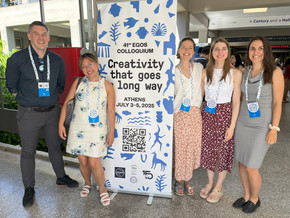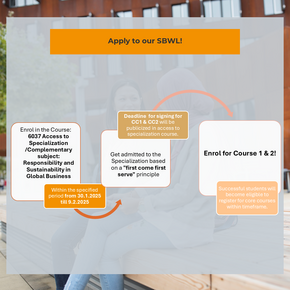In this article, our colleagues reflect on their experiences at the 41st EGOS - European Group for Organizational Studies Conference, one of the key conferences in the field of organization studies, which took place on July 3–5 in Athens.
Nathania Chua and Christof Miska presented their work, “A theory of purpose-driven divergence” in the sub-theme “The Purpose of Business Organizations Revisited and Re-Imagined”.
With purpose becoming more and more relevant to both business practitioners and academics, there have arisen many opportunities and challenges in critically assessing the role of businesses today. Addressing this, their research looks at the theories that have determined purpose and propose a theory of why companies would diverge from certain expectations.
Presenting their work to such a dedicated group of scholars on purpose reflects steps in not only advancing their research, but developing a strong network of a purpose community in Europe and beyond.
Prof. Miska also presented the paper, “Gendered Power in Times of War: Temporary Inclusion or Lasting Transformation?”, co-authored with Sara Moghaddam Tabar, who is pursuing her doctorate at our Institute.
In addition, as Section Editor, Christof joined the Journal of Business Ethics editor team dinner - a space full of energy and collegiality, where editors exchanged ideas and shared updates on ongoing editorial work.
Our PhDs engaged in scientific discourse
Nina Peitler presented the status quo of her paper “Governing CSR: The cross-national diversity of public and private authority interactions in shaping CSR”, which will explain how CSR is governed through a blend of public and private authority across different national contexts.
Nina’s presentation took place at the sub-theme “Organizing the Business and Government Interface in a Shifting Geopolitical and Regulatory Landscape”. The track explored the increasingly complex geopolitical and regulatory environments in which organizations are embedded and featured presentations from renowned researchers.
Katharina Salomon presented the early stages of her empirical research in the PDW “Research Methods and Strategies for Co-Creating Desirable Futures with Practitioners.” For her, it was a valuable space to reflect on the opportunities and challenges of ethnographic research related to societal impact. She came away with insightful input on how to approach ethnography and was reminded of the importance of staying open and curious in the research process.
In line with the topic of her PhD project, she also attended the sub-theme “Insider Social Change Agents: Catalyzing Action on Social and Environmental Challenges.” One of the most striking takeaways for her was the diversity of roles and spaces in which change agents can be found — from librarians to commodity traders and consultants. It expanded her view of where societal transformation can emerge, and the many forms it can take.
Mihaela Stratulat participated in sub-theme “Public and Private Sector Resilience: Creative Action that ‘Goes a Long Way’ through Turbulent Times”. One of the papers in her dissertation will focus on corporate resilience, with a particular interest in how stakeholder collaboration influences it. The conference offered a chance to get acquainted with the academic dialogue in this field.
Among the broader sessions, the sub-plenary “Creating Desirable Futures: Challenges and Prospects for Organizational Scholars” provided thought-provoking reflections on the role of organizational research in shaping future societal directions.
Our team left EGOS inspired and energized by a vibrant scholarly community that fosters idea exchange, diverse perspectives, and staying connected to the latest developments in their field.
![[Translate to English:]](/fileadmin/wu/_processed_/8/7/csm_050-Laptop-960_v1_56a43910b1.jpg)

